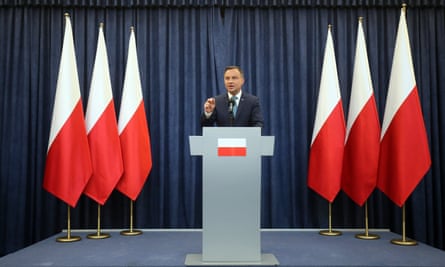Poland’s president appears to have bowed to the pressure of nationwide protests by announcing he will veto controversial judicial reforms that would wipe out the supreme court’s independence and allow the justice ministry to appoint judges.
Andrzej Duda’s surprise announcement was interpreted as a rare reprimand of the ruling Law and Justice party, (PiS) with whom he normally has a close relationship.
Commentators were shocked at the move, interpreting it as a major setback for PiS, which has made a big issue out of controlling Poland’s independent institutions, particularly the judiciary, since it came into power in 2015, and hailing it as a victory for demonstrators.
Duda, in a televised address, said: “These laws must be amended.” He said his rejection of the proposed bills would be criticised “probably by both sides of the political scene”, but that they “would not strengthen the sense of justice in society”.
Q&AWhy does the Polish government want to appoint judges?
Show
The attempt by Poland's Law and Justice party to take control of the judicial system should be seen as part of a wider campaign to dismantle democratic checks and balances on the government’s actions, from its takeover of state media to its capture of the country’s constitutional tribunal.
Jarosław Kaczyński, PiS’s leader, has developed a theory known in Poland as ‘impossibilism’, the idea that no serious reform of Polish society and institutions is possible due to these checks and balances, and what he describes as the vested interests of liberal elites and foreigners intent on exploiting the country.
The proposed measures he said he would veto included one to remove all judges of the supreme court, except those chosen by the justice minister, and another under which parliament would have been given the authority to appoint members of the National Council of the Judiciary.
Explaining that his decision had resulted from lengthy consultations he had held with legal and other experts over the weekend, he said: “I have decided to send back to parliament – in which case to veto – the law on the supreme court, as well as the law on the National Council of the Judiciary.”
His declaration followed eight days of demonstrations across the country, in which hundreds of thousands of Poles have taken to the streets in the capital, Warsaw, as well as hundreds of other towns and cities, and held vigils in front of courthouses.
Protesters marched by candlelight again on Sunday night, ahead of the president’s much anticipated decision, and a day after the Polish senate had followed the lower house of parliament and voted for the reforms on Saturday.
Under banners emblazoned with slogans such as “Free courts” and “Freedom, equality, democracy”, demonstrators pleaded with Duda – himself a lawyer – to reject the laws, claiming they marked a shift towards authoritarian rule.
Investors’ interpretation of Duda’s announcement as having stalled a constitutional crisis caused the Polish currency, the zloty, to rise against the euro.
The proposals had also set Poland on a collision course with the European commission, which had threatened to stop Poland’s voting rights if it introduced them. Donald Tusk, the European council president and a former Polish prime minister, had warned of a “black scenario that could ultimately lead to the marginalisation of Poland in Europe”.
There has also been criticism from Washington, with the US state department voicing its concerns. When President Trump visited Warsaw earlier this month he praised Poland’s leaders for their patriotism but did not mention the judicial reforms.
The legal amendments had their first parliamentary hearing on 18 July and were adopted by the lower house, followed by the upper house four days later. The only procedure preventing them from entering the statute books was the presidential signature.
Duda’s declaration marks the first time that he has publicly split with Jarosław Kaczyński, the head of PiS. Since his inauguration, Duda has been seen as something of a Kaczyński puppet from whom he effectively takes orders, leading to much mockery of him. Some commentators are sceptical whether his apparent assertion of his authority is authentic, or merely an attempt to take the edge off the protests. Although he insisted on Monday that political interference in the judiciary should not be up for discussion, some predict Duda will propose new conditions that do little to address the main concerns about the legislation and they fear he will fail to veto a third bill affecting the independence of regional and local courts.

Katarzyna Lubnauer, head of the parliamentary caucus of the opposition party Nowoczesna, welcomed the veto. “What we had wasn’t a reform, but appropriation of the courts,” she said. “I congratulate all Poles, this is really a great success.”
Human rights organisations welcomed the president’s veto but urged vigilance. “With this decision President Duda has pulled Poland back from the brink of all-out assault on the rule of law,” said Gauri Van Gulik, the deputy Europe director at Amnesty International. “These reforms would have brought the justice system fully under the heel of the government, removing judicial independence and jeopardising fair trial rights in Poland,” he added.
Van Gulik said the demonstrations had helped to bring about the veto, which was a “tribute to the power of public protest”, adding: “It is partly thanks to people power that this alarming scenario has been averted.”
But opponents of the law urged Duda to go ahead and also veto the third bill, which would give the government the power to appoint the heads of common courts.
Hundreds of participants of the protest rallies face trial in the courts, having refused to pay fines for barricading the streets or penetrating police barriers.
Kaczyński’s government has staunchly defended the law changes, calling them vital in the fight against corruption and necessary to help make the judicial system more efficient. It has accused opponents of the moves of being representatives of the elite trying to protect their privileged status.
Among the experts Duda said he had consulted were lawyers, sociologists, historians, philosophers and anti-communist dissidents.
The person who had guided him most, he said, was Zofia Romaszewska, a prominent campaigner of the 1970s and 80s, who he said had told him: “Mr President, I lived in a state where the prosecutor general had an unbelievably powerful position and could practically do anything. I would not like to go back to such a state.”
Among those to praise Duda was Lech Wałęsa, the former president and erstwhile shipworker and leader of the Polish labour union Solidarność, which helped bring down communism across Europe. Wałęsa called his decision “difficult and courageous”, saying it showed that Duda “begins to feel like a president”. But he urged Poles to continue their protests to force Duda to also reject the third bill.
